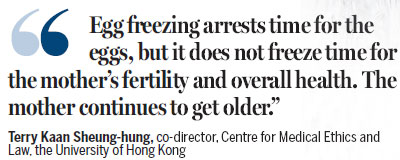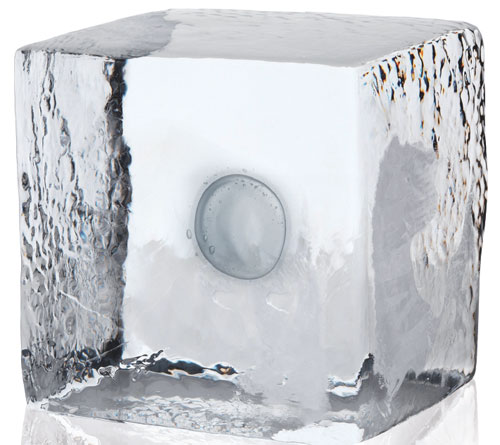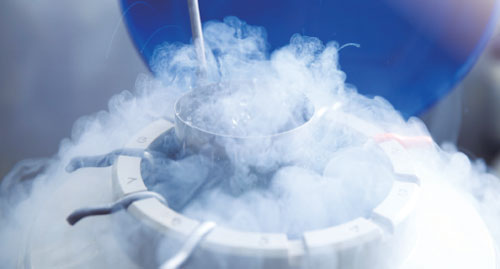Embryo of hope
Updated: 2015-11-04 09:22
By Frannie Guan(HK Edition)
|
|||||||||
While freezing one's eggs is a way of deferring childbirth until one is ready, not every one of these frozen ova will materialize into babies. Frannie Guan reports.
The unyielding demands on the city's workers - the sometimes "notorious" work ethic that fuels the city's fast pace - is a significant factor contributing to a future of economic decline and a shrinking population, say experts.
Yip Siu-fai, a non-official member of Hong Kong's Steering Committee on Population Policy, points to the city's notoriously low fertility rate (1.234, 2014), and says the city's failure to reach the long sought-after, work-life balance is one of the leading causes.
The low fertility rate doesn't mean Hong Kong women don't want to have babies, says Yip, but they are putting it off. Some are turning to reproductive technology, delaying pregnancy until past their normal reproductive years, up to age 35. Experts caution, however, that there is a limit to how far technologies can help stretch late motherhood.
Forty-two-year-old Michelle Ng, a finance manager and mother of one girl, wants another child. "A second child can help share the burden of taking care of us when we get old," said Ng. "If we are no longer with them, they can provide support to each other."
For the time being, Ng said she can't afford to take time off work to have another baby. "Especially in the past year, I have been extremely busyand I don't want to miss the crucial period to build up my career," said Ng. She delayed having her first child until she was 35, instead focusing on burnishing her professional standing. But after 35, the likelihood of pregnancy drops sharply, in large part because of the shrinking reservoir of potential eggs.
When a girl reaches puberty and begins menstruation, she produces about 400,000 follicles in her ovaries and with each menstrual cycle. Due to limited hormone production, only one follicle can mature into a fertile egg. The thousand other follicles will die. During a normal, healthy life cycle, a woman will ovulate only about 400 eggs.
"By the time they are 37, women have less than 10 percent of the eggs they had at puberty, and these eggs are often not of good quality," said Dr Louis Chan Yik-si of the Hong Kong Reproductive Medicine Centre.
How late is too late?
Michelle Ng worried that the window of opportunity might close before she could have a second child. A physician client suggested that she froze some of her eggs before they are completely exhausted, leaving her option open to have a baby later on. Ng followed up the doctor's advice with a blood test. The results showed that her ovary reserve was equivalent to that of a 35-year-old woman. She resolved to have 20 of her eggs frozen.
"We have more and more women coming to have their eggs frozen," said Chan. The statistics collected by the Council on Human Reproduction Technology are incomplete, due to poor reporting and the fact that some women travel abroad. Current figures reveal that the number of eggs stored by the city's reproductive technology centers increased from 124 in 2011 to 306 in 2014. Ng's friends and colleagues, including unmarried ones, have gone through the procedure.
Most patients, says Chan, decide on freezing their eggs when they are already in their late 30s or early 40. By then their ovaries are near exhausted. Ng was lucky, he said. A 37-year-old patient who worked in the toy industry for 15 years came seeking help, but after two weeks of hormone injections, doctors were able to extract only one egg. "She cried in front of me," said Chan.
One of the reasons why some patients wait too long, says Chan, has got to do with financial pressure. "By the time they are 25 they probably have not made enough money to freeze their eggs," said Chan.
It cost Ng around HK$60,000 for the full procedure, including freezing the eggs for the first six months. After that the reproductive technology center charges HK$8,000 per year for storage. Under the current Human Reproductive Technology Ordinance, eggs may be stored for no more than 10 years. A woman does have the right, however, to export her eggs to other jurisdictions, when the time limit in Hong Kong expires.
Raising children in Hong Kong is costly and parents work hard for as long as they can, to give them the best possible environment for growing up. Unofficial estimates put the cost of raising a child in Hong Kong at between HK$3 million and 4 million.
Drop in fertility rate
The inescapable irony behind all this is that present-day economic conditions pose a threat to the SAR's future. In 2014, only 1,234 babies were born to every 1,000 women, over the full span of their child-bearing years in Hong Kong (i.e., a fertility rate of 1.234). A fertility rate of 2.1 is the minimum for maintaining a stable population. The city's fertility rate has decreased dramatically over the past 30 years. A survey conducted by the Family Planning Association found that the proportion of childless families increased from 16.1 percent in 2007 to 23.4 percent in 2012.
Hong Kong faces a precipitate fall in population, a problem compounded by the fact that it is one of the most rapidly aging cities in Asia, already threatened by a growing labor shortage, affecting the city's productivity and standing in the global community.
Yip, also a professor at the Department of Social Work and Social Administration at the University of Hong Kong, referred to a survey where 39 percent of women said they had fewer children than they wanted. That was the widest gap between the number of children women wanted and that which they actually produced since 1987, he added.
That people are waiting longer to get married has compounded the problem. Analysis of the latest government census reveals that the average age at which Hong Kong women get married for the first time has increased to 29.1 years. The figure is 31.1 for men. The average age of women having their first child has been pushed to 31.3 years in 2014. The average was 25.1 in 1981.
Late marriage and late parenting, as Yip explained, are due in large part to the city's unfriendly working environment for families. Not only do people work hard, but they are expected to work long hours. "Sometimes women say they just do not have time to go out to meet men," says Yip.
"I think every developed city faces the same problemthat is, women get married later and later," said Chan. For those who want to focus on career a little longer and at the same time retain their reproductive potential, Chan said egg freezing was probably a workable option.
Embryo freezing is easier
Egg freezing is a leading example of advanced reproductive technology, used worldwide to help women preserve their eggs for future pregnancies. Chinese actress and film director Xu Jinglei made news when at 41 she traveled to the United States to have her eggs frozen. The Chinese mainland bans the practice for single women.
The case triggered public reaction. The loudest voices were those who believe it is a woman's natural right to have her eggs frozen. They argue that the government should not interfere with family planning at that level. Those who oppose the practice argue that despite the advancement of technology, the success rate of egg freezing is much lower than that of embryo freezing, as eggs, having high water content, are more difficult to freeze.
"Freezing eggs is an invasive procedure, and the psychological burden on the mother should not be underestimated," said Yip. Chan added that the risks involved in the procedure include infection and bleeding, just as in any other surgery. "They need to understand also that it does not guarantee a child," said Chan.
The full procedure takes about 4 weeks. Before the eggs are removed, a woman is required to undergo a health check and counseling. During the final two weeks leading up to the medical procedure, women are prescribed daily follicle stimulating hormone (FSH) injections to stimulate egg production.
After two weeks of stimulation, doctors retrieve mature egg cells from the ovary and choose healthy eggs that will be frozen and stored in liquid nitrogen.
Egg freezing helps women to extend their fertile period, but Yip is doubtful that it offers a solution to the city's fertility rate. "Going through this should be a last resort," said Yip. "When women plan to have a family, it is better for them to come out with a more effective way to fulfill family objectives by planning ahead."
"Egg freezing arrests time for the eggs, but it does not freeze time for the mother's fertility and overall health. The mother continues to get older," said Terry Kaan Sheung-hung, co-director of the Centre for Medical Ethics and Law at the University of Hong Kong. "If we think about the right of women to have a child, we should also consider the interests of the child." He contended that it is to the greater benefit of the child to be born to a relatively young couple, than to couples in their late 40s.
He also pointed out that those who may want to use the technology also need to consider what they will do with the rest of the eggs, since usually they won't use all the eggs frozen and stored. "Do you destroy them or give them to research? That is not an easy choice."
Kaan added that he would applaud the technology in cases of unavoidable health setbacks, such as young women with cancer, freezing eggs before chemotherapy, but he was far more cautious about using technology to overcome problems which actually can be solved by other means.
Ng plans to use her frozen eggs next year. The eggs will be thawed, and then fertilized with her husband's sperm. She doesn't want to find a surrogate mother, but plans to carry the pregnancy herself.
Contact the writer at frannie@chinadailyhk.com
|
Egg freezing involves vitrification, that is, an ultra rapid cooling technique that allows the water inside and surrounding the egg to instantaneously cool into a solid state in liquid nitrogen. |


(HK Edition 11/04/2015 page10)
